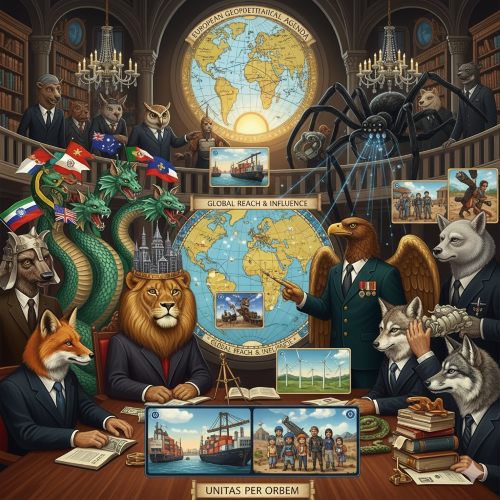What role do Africa’s vast mineral, oil, and agricultural resources play in European geopolitical agendas?

Africa's vast resources are central to European geopolitical agendas, serving as a cornerstone for economic stability, industrial competitiveness, and energy security. Europe's reliance on these resources shapes its political, economic, and even military strategies toward the continent.
Economic and Industrial Competitiveness
Europe's industries, from manufacturing to technology, heavily depend on a consistent and affordable supply of raw materials. Africa is a primary source for many of these, including oil and natural gas, vital for energy, and a wide array of minerals essential for modern technology and the green transition.
-
Critical Raw Materials: The global shift to green and digital economies has put Africa's mineral resources at the forefront of European policy. Minerals such as cobalt, lithium, rare earth elements, manganese, and platinum are crucial for producing batteries for electric vehicles, wind turbines, and other green technologies. European countries are in a race to secure a stable and diversified supply of these "critical raw materials" to avoid dependence on single suppliers, particularly China, which dominates the processing and refining stages. The EU's Critical Raw Materials Act (CRMA) is a prime example of this geopolitical agenda, aiming to secure these resources through strategic partnerships with African nations.
-
Agricultural Resources: Africa's agricultural sector is also key to European food security and industry. It provides a source for crops like cocoa, coffee, cotton, and palm oil, which are inputs for European food, textile, and cosmetic industries. Geopolitical strategies aim to secure these supply chains through trade agreements and investments that often favor European corporations.
Energy Security and Diversification
Following the 2022 Russian invasion of Ukraine, Europe's energy security has become a critical geopolitical priority. African natural gas and oil reserves, particularly from countries like Nigeria, Algeria, and Mozambique, have become a strategic alternative to Russian supplies.
-
New Gas Corridors: European nations are actively pursuing new energy partnerships and infrastructure projects, such as liquefied natural gas (LNG) terminals and pipelines, to transport African gas to Europe. This strategy aims to diversify Europe's energy mix and reduce its vulnerability to political leverage from other major energy suppliers.
-
Green Hydrogen: Beyond fossil fuels, Europe is increasingly eyeing Africa's potential for green hydrogen production. African countries with vast renewable energy potential (solar and wind) are seen as ideal partners for producing green hydrogen, which can then be exported to Europe to fuel its decarbonization efforts. This is a key focus of initiatives like the EU's Global Gateway, which seeks to invest in renewable energy projects across Africa.
Geopolitical Influence and Competition
The competition for African resources is a central front in the broader geopolitical contest between Europe, China, and other global powers. European strategies are designed not only to secure resources but also to maintain and expand their influence on the continent.
-
Countering Rivals: China's extensive investments and "no-strings-attached" approach have challenged Europe's traditional dominance in Africa. In response, European countries are packaging their resource-focused agendas with "values-based" propositions, emphasizing "sustainable development," "good governance," and environmental, social, and governance (ESG) standards. This is a strategic attempt to differentiate their engagement from that of competitors and appeal to African nations seeking more equitable partnerships.
-
Security and Stability: Europe’s geopolitical agenda links resource access to regional security. Many European military and security operations in Africa, particularly in regions like the Sahel, are justified as a means to combat terrorism and instability. However, these operations also serve to protect key trade routes and energy infrastructure, ensuring that resource flows remain uninterrupted. For instance, France's long-standing military presence in West Africa is closely tied to the region’s uranium and other mineral wealth, which are critical to French industries.
- Questions and Answers
- Opinion
- Motivational and Inspiring Story
- Technology
- Live and Let live
- Focus
- Geopolitics
- Military-Arms/Equipment
- Güvenlik
- Economy
- Beasts of Nations
- Machine Tools-The “Mother Industry”
- Art
- Causes
- Crafts
- Dance
- Drinks
- Film/Movie
- Fitness
- Food
- Oyunlar
- Gardening
- Health
- Home
- Literature
- Music
- Networking
- Other
- Party
- Religion
- Shopping
- Sports
- Theater
- Health and Wellness
- News
- Culture

